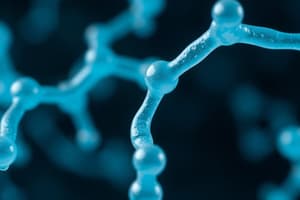Podcast
Questions and Answers
What distinguishes matter with biological processes from matter without?
What distinguishes matter with biological processes from matter without?
- Ability to change color
- Capacity for homeostasis, organisation, metabolism, growth, adaptation, response to stimuli, and reproduction (correct)
- Ability to conduct electricity
- Ability to emit light
What makes defining viruses as living organisms difficult?
What makes defining viruses as living organisms difficult?
- They have a defined lifespan
- They are made of complex cells
- They can survive extreme temperatures
- They replicate only in host cells (correct)
When did life originate?
When did life originate?
- At least 3.5 billion years ago (correct)
- At least 10 million years ago
- At least 1 billion years ago
- At least 5 billion years ago
Who proposed the system of binomial nomenclature for classifying living things?
Who proposed the system of binomial nomenclature for classifying living things?
What are living things mainly composed of?
What are living things mainly composed of?
What is the main factor that makes defining viruses as living organisms difficult?
What is the main factor that makes defining viruses as living organisms difficult?
What did Empedocles's materialism theory propose about life?
What did Empedocles's materialism theory propose about life?
According to Aristotle's hylomorphism theory, what do living things embody?
According to Aristotle's hylomorphism theory, what do living things embody?
What did Carl Linnaeus's system of binomial nomenclature contribute to the study of living things?
What did Carl Linnaeus's system of binomial nomenclature contribute to the study of living things?
What is the distinguishing factor of living things, according to the text?
What is the distinguishing factor of living things, according to the text?
Flashcards are hidden until you start studying
Study Notes
Understanding Life: Characteristics, Origins, and Classification
- Life is characterized by biological processes such as signaling and self-sustaining processes, and is defined by the capacity for homeostasis, organization, metabolism, growth, adaptation, response to stimuli, and reproduction.
- Philosophical definitions of living systems have been proposed, including the concept of self-organizing systems, but viruses complicate the definition as they only replicate in host cells.
- Life exists in various environments on Earth, including air, water, and soil, with diverse ecosystems forming the biosphere, some of which are harsh and inhabited by extremophiles.
- The study of life dates back to ancient times, with theories like Empedocles's materialism and Aristotle's hylomorphism attempting to explain its composition and nature.
- Life is believed to have originated at least 3.5 billion years ago, leading to a universal common ancestor and the evolution of all current species, including many extinct species that have left traces as fossils.
- Classification of living things began with Aristotle and was further developed with Carl Linnaeus's system of binomial nomenclature in the 1740s.
- Living things are composed of biochemical molecules mainly formed from a few core chemical elements.
- Life's distinguishing characteristics make it difficult to define, particularly when considering viruses and their replication in host cells.
- The biosphere is home to diverse ecosystems, some of which are extreme and support life forms known as extremophiles.
- The study of life has a long history, with ancient theories attempting to explain its composition and nature, and modern science providing insights into its origins and evolution.
- The origin of life is estimated to be at least 3.5 billion years ago, leading to the evolution of diverse species, some of which have left fossil records.
- Classification of living things has evolved from Aristotle's early attempts to modern systems like Linnaeus's binomial nomenclature, providing a framework for understanding and categorizing life on Earth.
Studying That Suits You
Use AI to generate personalized quizzes and flashcards to suit your learning preferences.




